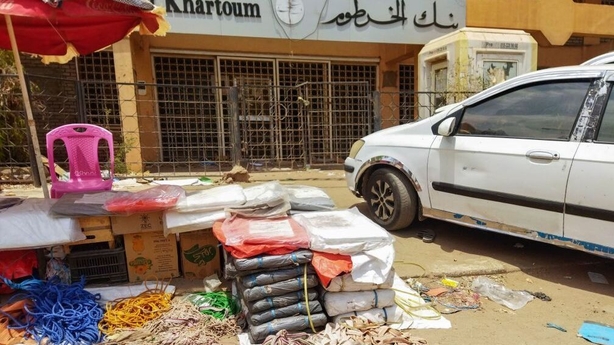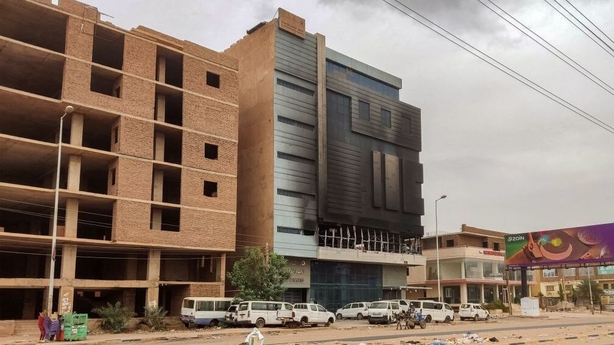At least 50 children - half of them babies - have died at an orphanage in the Sudanese capital Khartoum in the six weeks since war broke out.
Dr Abeer Abdullah, who works there, said that on day alone - last Friday - at least 13 babies died.
A senior orphanage official confirmed the figures and a surgeon who has volunteered at the facility during the war said there had been at least several dozen deaths of orphans.
Both said the deaths were mostly of newborns and others under one year old.
All three cited malnourishment, dehydration and infections as the main causes.
The area around the state-run orpanage, known as Mygoma, remains dangerous.
Last week, airstrikes and artillery hit the district where the building is located and following an explosion in a neighbouring building, babies had to be moved from one of the orphanage's rooms.
UNICEF has warned that more than 13 million children are at risk as a result of the ongoing crisis in Sudan.
Warring generals have agreed to extend by five days a humanitarian ceasefire they repeatedly violated and that failed to deliver promised aid corridors.
Residents said they could hear gunfire tonight, shortly before the truce extension was announced.
Earlier, they reported street battles in northern Khartoum, as well as artillery fire in the south of the city, where a plume of grey smoke was visible.
Yesterday, mediators from the United States and Saudi Arabia had said there were "violations by both parties that significantly impeded" the ceasefire's goals of allowing humanitarian aid for civilians, delivered through secure corridors, and the restoration of essential services.
They added that both the army headed by General Abdel Fattah al-Burhan and its enemy, the paramilitary Rapid Support Forces (RSF) led by Mohamed Hamdan Daglo, were "posturing for further escalation".
But shortly before the initial one-week truce was to expire tonight, Washington and Riyadh announced the extension.
"While imperfectly observed, the May 20, 2023 ceasefire enabled delivery of humanitarian assistance", they said in a joint statement. "The extension will permit further humanitarian efforts."
Since the truce began one week ago, frightened residents have ventured out to try and get food or water, the costs of which they say have doubled since the start of the war.
But many families continue to shelter, rationing water and electricity while trying desperately to avoid stray gunfire in the city of more than five million people - nearly 700,000 of whom have fled, according to the United Nations.
In Darfur, on Sudan's western border with Chad, continued fighting "blatantly disregards ceasefire commitments", according to Toby Harward, of the UN refugee agency.
"Intermittent fighting between Sudanese armed forces and Rapid Support Forces (RSF) in El Fasher, North Darfur over the last few days" has seen civilians killed, homes looted and tens of thousands newly displaced in the already war-ravaged region, he said.
30 newborns dead in East Darfur hospital
The persistent fighting has impeded delivery of essential humanitarian aid needed by 25 million people, more than half the population, according to the UN.
A week ago, representatives of army chief Abdel Fattah al-Burhan and his former deputy turned-enemy Mohamed Hamdan Daglo, who commands the paramilitary RSF, signed a written agreement to pause the incessant air strikes, artillery fire and street battles in order to allow in much-needed aid and restore essential services.
But by the seventh day of the truce - due to expire tonight - no humanitarian corridors had been secured, and relief supplies had only trickled in, including to replenish the few hospitals that are still functioning in the capital.
In East Darfur state, more than 30 infants have died in a single hospital since fighting began, including "six newborn babies who reportedly died in one week alone due to problems including lack of oxygen amid electricity blackouts", according to the World Health Organization.

Since 15 April, at least 1,800 people have been killed, according to the Armed Conflict Location and Event Data Project.
More than one million others are displaced within Sudan and nearly 350,000 have fled to other countries, the UN said.
Sudan's neighbouring states - many already mired in instability - fear regional spillover and have pleaded for aid from the UN, itself reporting severe financing gaps.
The UN said Sudan has become one of the highest alert areas for food insecurity, requiring "urgent" action from the international community.
Aid agencies have also warned that with the rainy season approaching next month, parts of the country will become inaccessible, while the risk of cholera, malaria and water-born diseases will rise.
Sudan's already fragile health sector faces compounded challenges, with three quarters of hospitals in combat zones out of service, according to the doctors' union.
Even health facilities in areas largely untouched by fighting and looting are unable to replenish supplies as they attempt to serve an influx of those displaced by the war.

The army and the RSF have said they are willing to discuss extending the ceasefire, which mediators from the United States and Saudi Arabia called for.
But Riyadh and Washington said "both parties are posturing for further escalation".
Even with a potential extension of the truce, the UN warned of "growing reports of unexploded ordinances" in the capital and other densely-populated areas.
The governor of Darfur - a former rebel leader allied with the military - called yesterday on civilians to take up arms.
This came after the defence ministry appealed for "army pensioners" and reservists to head to command units, while some members of tribes in the country's east earlier demanded to be given weapons.
The Umma party, one of Sudan's main civilian groups, cautioned against such calls which it said were "attempts to drag the country into civil war".
Yassir Arman, a leader in the Forces of Freedom and Change - the pro-democracy movement sidelined in a 2021 coup led by Mr Burhan and Mr Daglo - accused officials from the former regime of military-Islamist strongman Omar al-Bashir of intending to "prolong the war, dragging civilians and tribes towards it".
According to experts, Mr Burhan is facing more and more pressure from his own Islamist supporters and remnants of the Bashir regime, with whom he had built a symbiotic relationship in order to gain power.
Mr Arman warned that they are now seeking to capitalise on the chaos of war, preparing to position themselves as the stable alternative, thereby "restoring their lost paradise".

